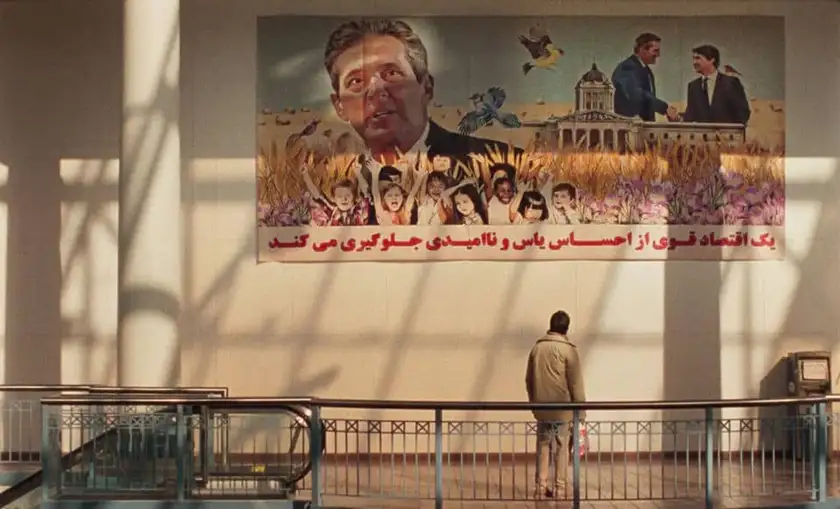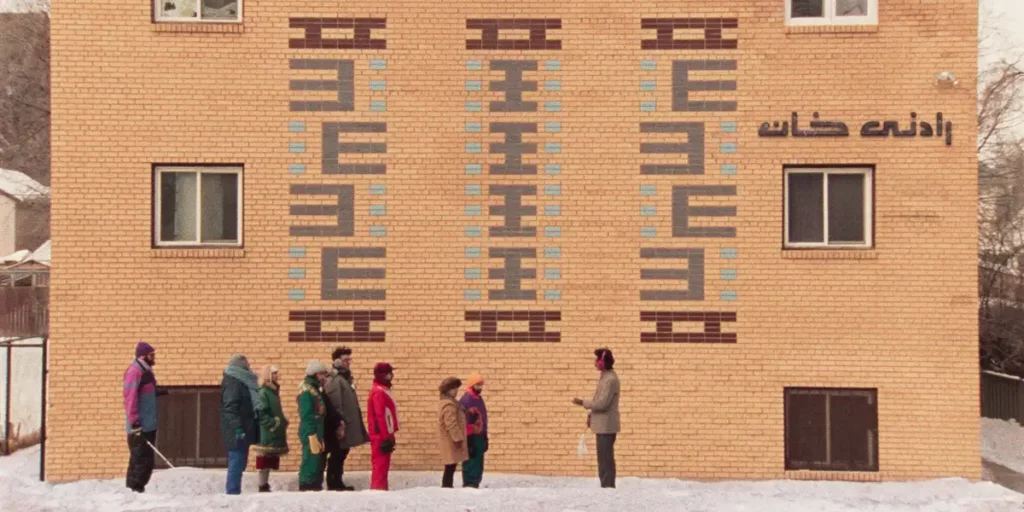Matthew Rankin’s Universal Language is a perfect film about the power of connection, full of absurdist humour, Iranian culture and snowy Canadian landscapes.
Director: Matthew Rankin
Genre: Drama
Run Time: 89′
Cannes Premiere: May 18, 2024
U.S. Release Date: February 12, 2025
U.K. Release Date: TBA
Where to Watch: in select theaters
I didn’t know quite what to expect from Universal Language, the new feature from Matthew Rankin that premiered during the Director’s Fortnight strand at Cannes. The only certainties were that it would be very eccentric and very Canadian. Films like the 2014 short Mynarski Death Plummet or his full-length debut The Twentieth Century have seen him show the country’s modern history through a creative, uber-stylised and absurdist lens.
With Universal Language, Rankin imagines that his hometown of Winnipeg has been integrated with Iran, inspired by a long-held devotion with the country that began with its cinema. The result is an experience that is uniquely off-beat yet exquisite.
Rankin plays a version of himself, an official for the Québécois government who is moving from Toronto to be with his ailing mother. But when he arrives in Winnipeg and calls her, a man named Massoud (Pirouz Nemati) answers. He is a tour guide who takes tourists on walks through the city’s unspectacular sights, including the Centennial Parking Pavilion (“the jewel of the Grey District!”) And he has been living with Matthew’s mother for a while.
Meanwhile, a young girl named Negin (Rojina Esmaeili) has found a banknote frozen in the ice. She wants to use the money to help classmate Omid (Sobhan Javadi), whose glasses were stolen by a turkey. So she and her older sister Nazgol (Saba Vahedyousefi) end up on a wild goose chase to dig the money out. Soon, all these characters will interact and interweave with one another on a journey involving turkeys, tea and Kleenex stores.
Universal Language is obviously indebted to the films of directors like Abbas Kiarostami and Jafar Panahi, particularly The White Balloon (which Kiarostami wrote and Panahi directed, and which saw a child on a quest to retrieve something). But there is a lot of Wes Anderson’s work present here too. There are muted pastel aesthetics, flat compositions and a handful of precocious children. The latter is seen in the film’s very first scene, where one kid is dressed like Groucho Marx and another says he wants to breed donkeys when he grows up. As the film progresses, its short vignette-style scenes, unusual tone and warm-hearted eccentricities also remind you of David Byrne’s True Stories.

At the same time, Rankin is forging his own style. In the press notes, he describes Universal Language “like a confluence of rivers. Or a Hawaiian pizza.” And in the textured world he has created, priority is equally given to the histories and cultures of Quebec, Manitoba and Iran. Characters alternate between speaking French and Farsi but easily understand each other (something which links to Rankin’s main message). There are multiple references made to Métis leader Louis Riel and the 1995 Quebec independence referendum. There is even a cameo from a Canadian landmark – a Tim Hortons store, though not as you might recognise it.
The film looks gorgeous, with DP Isabelle Stachtchenko shooting wide tableaux on 16mm. Those include snowy Canadian landscapes, but also shots of the brick and concrete buildings that tower over Negin and Nazgol. They may all be beige, as a frustrated Negin says at one point. However, the interiors are captivatingly retro and feel lived-in courtesy of production designer Louisa Schabas. Elsewhere, editor Xi Feng makes good use of crossfades, and there is a Persian-influenced score by Amir Amiri and Christopher Lamarche-Ledoux.
When Matthew eventually meets Massoud, he asks why he has been taking care of his mother. Why do so much for a stranger you don’t know? Massoud’s response sums up the film’s message: “We are all connected.” Rankin frequently highlights the intersection of cultures and lives in Universal Language. It is there in the title, referring to how everyone here speaks languages from different sides of the world (because they are conversing in the universal language of humanity). It is there when Matthew returns to his old childhood home, becoming friends with the family now living there. It is there when Rankin begins playing with time and space, switching roles around and adopting a non-linear structure.
Universal Language is a perfect film about the power of connection, surreal and abstract at times but extraordinarily likeable. The colours are drab, and scenes can feel as banal as the landmarks Massoud shows on his tours (an abandoned suitcase on a bench, a mall where the fountain was removed). But both are as strangely inviting as the film itself. Plus, the exceptionally well-written script by Rankin, Nemati and Ila Frouzabodi finds constant humour, whilst giving time to individual moments that interconnect seamlessly into one singular, wonderful portrait. A portrait of togetherness that operates, as the opening text in Farsi says, “in the name of friendship.”
Universal Language premiered at the Cannes Film Festival on May 18, 2024 and will be released in select US theaters on February 12, 2025.

